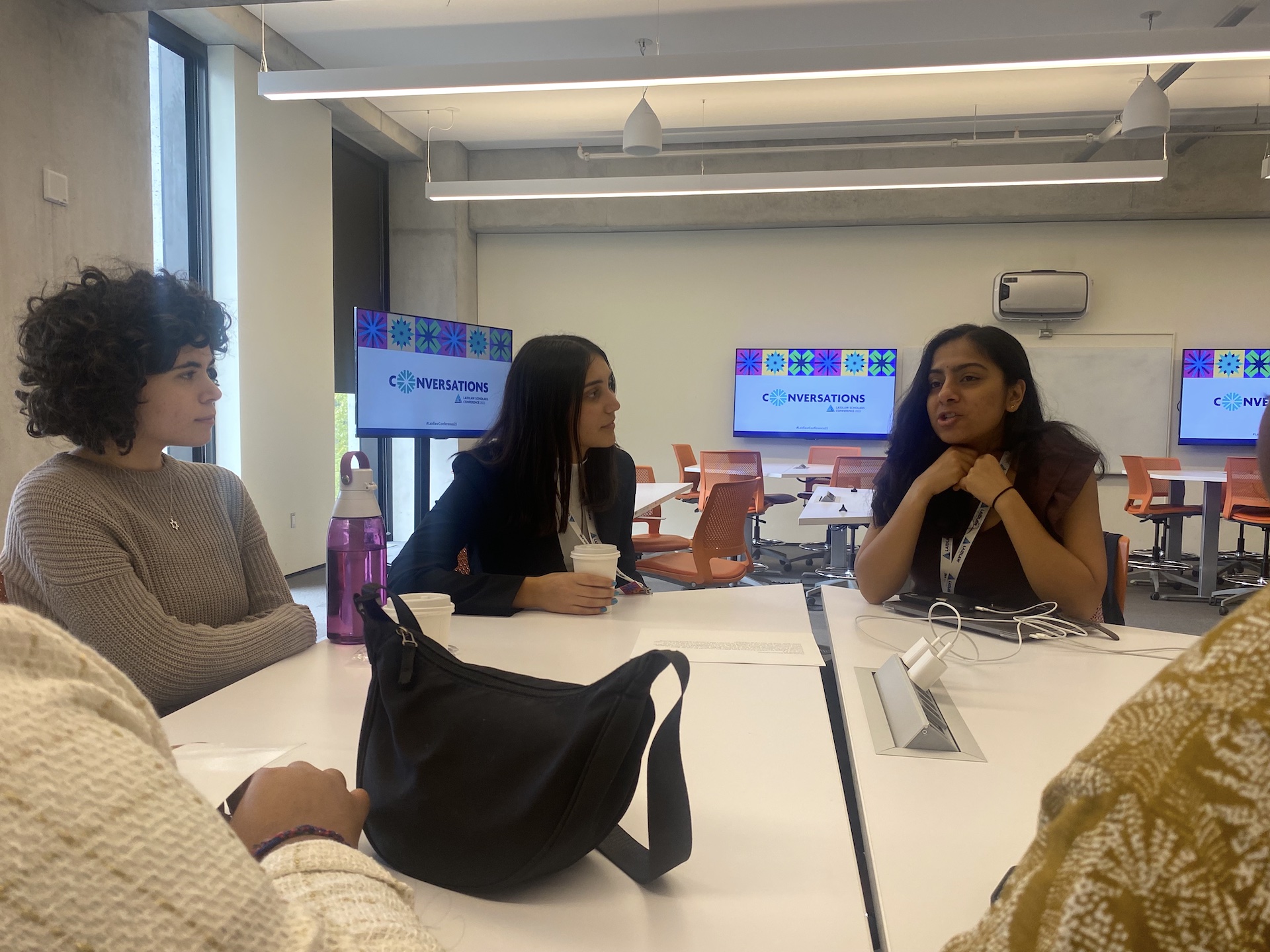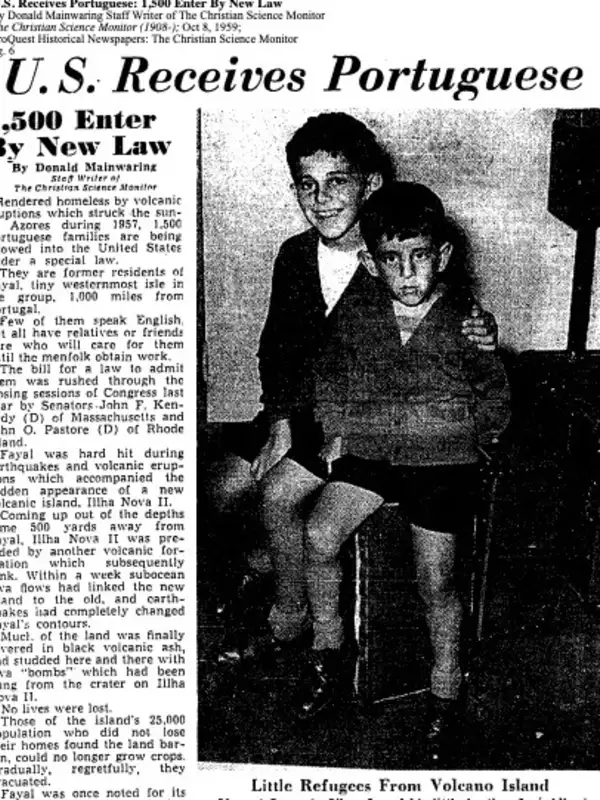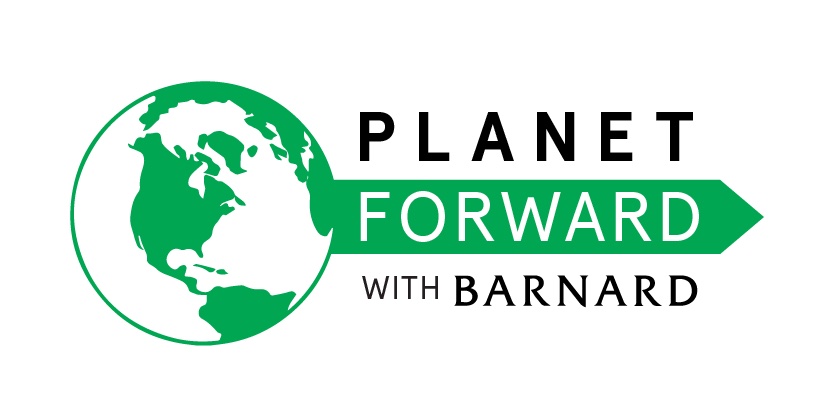When this year’s United Nations climate change conference — the 28th “conference of the parties,” abbreviated as COP 28 (November 20-December 12) — addresses the future of climate migration and access to basic human rights, history major Parisa Harvey ’26 will be paying close attention.
Realizing how overlooked environmental justice crises have been, Harvey began exploring the intersection of climate change and forced migration as part of her Laidlaw Scholars Leadership and Research Program project.
“I have come to realize how fundamentally connected these [problems] are and the dangers of treating them as separate issues,” said Harvey. “With the COP 28’s announcement of ‘putting nature, people, lives, and livelihoods at the heart of climate action,’ refugees and climate-displaced people need a seat at the table.”
This fall, Harvey presented her project at a Laidlaw poster session and contributed her research to a historical case study examining the United States’ mid-20th century refugee laws and the natural calamity provision. As she worked with her advisor, professor of history José C. Moya, Harvey’s interest in climate-induced migration expanded to include how governments recognize or respond to environmental refugees.
“I was drawn to Laidlaw because of the program’s emphasis on finding solutions to intractable problems,” said Harvey. “As I plan for the Leadership in Action portion next summer, I am excited to do fieldwork and research. I plan to work with organizations that help asylum seekers in New York City.”
In this “5 Questions With…” interview, Harvey advocates for frontline communities — one of the overlapping themes at COP 28 — to be at the center of the upcoming climate talks.
What inspired your interest in human rights and environmental justice?
My interest stems from working in climate justice and immigrant justice spaces. As a youth organizer in high school, I pushed for greater environmental protection and education bills in the state of Washington. After coming to Barnard and working with Columbia’s Students for Sanctuary, I have learned more about asylum seekers’ insurmountable challenges after relocation, even in [presumably] welcoming sanctuary cities like New York. Becoming a part of Laidlaw has given me a chance to investigate these intersections with faculty support and leadership training. This kind of collaboration was critical throughout my literature review, working with archival documents, and workshopping of final posters.
How has the Laidlaw program helped you to develop your research process?
Human rights, migration, and environmental justice are large issues with high stakes. Laidlaw helped me hone in on a specific question and method that was digestible and realistic for the six-week research project in the spring. Our weekly leadership training helped me to think about how my research was part of a larger, ongoing conversation.
In one of our weekly programs, we had the opportunity to hear from a panel of faculty and learn about their research processes. Wendy Schor-Haim, [the director of the First-Year Writing Program], shared the framework, “I’m researching X, because I want to figure out Y, so that I can understand Z,” which really resonated with me. Applying this framework, I researched the legislative record and historical newspapers to figure out the significance of the natural calamity provision so I could understand the social and legal contexts of the disaster visa program in the United States.
Why do the nations at COP 28 need to address the correlation between human rights and natural disasters?
Climate change is a threat multiplier. Natural disasters compound with other forms of social and political persecution, and, even as the United Nations estimates that over 20 million people are forcibly displaced by climate disasters annually, existing legal frameworks fail to recognize the concept and reality of climate-displaced peoples. The phrases “environmental refugee” or “climate refugee” bear no weight in legal protection regimes, as domestic and international refugee laws define persecution based on race, religion, nationality, or membership to a social or political group. In today's changing climate, nature can be as devastating as persecution, and we need policy to reflect that reality.
Governments withhold disaster relief for marginalized groups, directly participate in environmental degradation, or have insufficient climate mitigation and resilience programs. When aid is insufficient to rebuild infrastructure and restore a sufficient quality of life in disaster-stricken areas, migration is a last resort. Current legislative approaches to aid climate-displaced peoples have been mostly ad-hoc schemes or other temporary measures that don’t support long-term needs.
I believe that nations overwhelmingly responsible for emissions driving our changing climate — many of which would attend COP 28 — have a legal and moral obligation to create pathways to citizenship for climate-displaced peoples.
Why is the climate refugee crisis the most pressing environmental justice issue to be negotiated at these COP 28 talks?
My study focused on legal protections following rapid-onset disasters like a volcanic eruption or earthquakes. Equally as important is expanding protections for victims of slow-onset disasters, such as drought and sea level rise. Rapid-onset disasters are much easier to classify as drivers of migration, similarly to how one might demonstrate credible fear on the five grounds of asylum. Slow-onset disasters compound with others forms of persecution and exacerbate preexisting vulnerabilities, making it hard to identify environmental destruction as the single cause of migration. Mitigating slow-onset climate change is critical, while also bracing for the reality of the inundation of low-lying island nations and the legal questions that will arise in such an event.
What’s significant about Dubai hosting the COP 28?
It’s particularly interesting given the prevalence of migrant labor in the Gulf region. There have already been reports of dangerous working conditions and excessive warnings for workers constructing conference spaces. It will be interesting to see how climate justice is addressed at the conference despite it being housed in a city that runs on fossil fuel wealth and is rapidly expanding using migrant labor.
However, [any] COP that takes place is critical for climate mitigation and disaster reduction to prevent future displacement. Although climate displacement will likely continue, it is a last resort and can be avoided. The United Nations High Commission for Refugees and the United Nations Environment Programme work on issues of climate migration. It is critical that these organizations come together at the COP 28 and that all international accords center climate-displaced people’s voices throughout the entire process of policymaking, negotiations, and planning.



